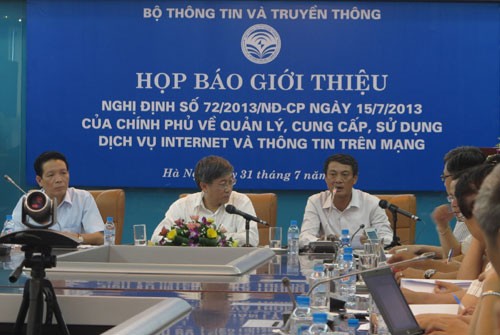(VOVworld) – The Ministry of Information and Communications has introduced decree 72 on the management, supply, and usage of internet services aiming to ensure a fair and transparent trading environment for the development of new forms of internet information. Criticism from unfriendly organizations and individuals that decree 72 is a great threat to online reporters and bloggers is unfair.

The Ministry of Information and Communications held a press conference to introduce decree 72 on the management, supply, and usage of internet services. (photo:thanhnien.com.vn) |
Decree 72 consists of 6 chapters and 46 articles covering internet services and resources, the management, provision, and usage of online information, the establishment of websites and social networks, information about telecommunication networks, online games, and online information safety and security. The decree generates conditions for the development of internet information forms by licensing websites, social networks, and service supply registration. The decree also defines the rights and obligations of online information suppliers and users and the management of cross-border information supply in line with Vietnamese law and international conventions to which Vietnam is a signatory. Deputy Minister of Information and Communications Le Nam Thang spoke at a press conference introducing the decree: “When creating decree 72, we had to ensure that regulations create conditions for international integration and cooperation and the development of e-commerce. We have taken into consideration international laws that Vietnam has signed, particularly regulations of the WTO and bilateral and multilateral agreements, to guarantee that the decree matches Vietnam’s conditions and abides by international law.”
The content of decree 72 has been made public. But before and after the decree’s issuance, the Vietnam Committee on Human Rights (VCHR) in France and the Committee to Protect Journalists (CPJ) in the US distorted Vietnam’s press freedom, saying that “decree 72 targets freedom on the internet” and calling it “a great new threat to online reporters and bloggers”.
Decree 72 has no word or sentence prohibiting individuals from using social networks to share and collect information, so it has never been “a threat to online reporters and bloggers”. According to the decree, individuals have the right to collect and share information on social networks. It stipulates that individuals are allowed to cite information and attach a link to the source information so other people can refer to the original, full information. The decree aims to protect intellectual property rights and the copyright of press agencies. In fact, many press agencies are concerned about copyright and author rights.
In addition to creating a legal corridor for new types of information to develop using the internet, decree 72 consolidates information safety and security on the internet. Managing and creating conditions for internet development are what Vietnam and any other nation that has access to the internet must do. In that sense, it’s in line with international law and Vietnamese reality. Deputy Minister of Information and Communication Le Nam Thang said: “In order to handle harmful and illegal information on the internet, we use more than administrative, technical, and economic measures. The most important measure is the community and that online media agencies have to supply authentic and accurate information to the public. The awareness of internet users is also important. We should improve communication at schools and in families and society to guide internet users toward good and healthy information.”
Over the past decade, Vietnam has consistently recorded a high internet growth rate, the third highest in Southeast Asia. The Ministry of Information and Communications reports that Vietnam has nearly 5 million broadband internet subscribers and 3.3 million 3G service subscribers. By late last year, Vietnam had over 31.3 million internet users, almost 36% of the population. These figures are visible proof of internet freedom in Vietnam. In the context of internet development toward competitiveness and international integration, like other countries in the world, Vietnam has to manage, supply, and use the internet and online information. The supply and usage of internet services in Vietnam must be in line with national morality, culture, security, and laws, like decree 72, which is a valid tool for avoiding harmful side-effects of the internet, which could lead to immeasurable harm to society.